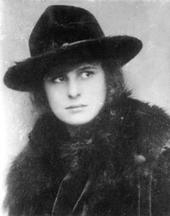™
Born in Berlin, I began my career as a self-styled and well-known interpretive dancer-dancing was what made me truly happy. After injuring a knee, I attended a film about mountains and became fascinated with the possibilities of the medium. I went to the Alps for about a year and when I returned,approached Arnold Fanck, the director of the film I'd seen earlier, asking for a role in his next project. I went on to star in a number of Fanck's bergfilme, presenting myself as an athletic and adventurous young woman with suggestive appeal. MY career as an actor in silent films was prolific, and I became highly regarded by directors and publicly popular with German film-goers. When presented with the opportunity to direct Das Blaue Licht in 1932, I took it. My main interest at first was in fictional films. My last acting role before moving to directing was in the 1933 film SOS Eisberg (U.S. title SOS Iceberg-this film was released on DVD in the U.S. in November 2005).I heard Adolf Hitler speak at a rally in 1932 and was mesmerized by his powers as a public speaker.During a personal meeting he asked me to make a documentary and, in 1933,I directed the short film Der Sieg des Glaubens (Victory of Faith), an hour-long feature about the Nazi party rally at Nuremberg in 1933.Hitler was impressed with my work, he then asked me to film the upcoming 1934 Party rally in Nuremberg. After initially turning down the project because I did not want to make "a prescribed film", I began making another film titled Tiefland. I hired Walter Ruttmann to direct it in my place. When I fell ill, Tiefland was cancelled. Upon my recovery, I reviewed Ruttmann's initial footage and found it to be terrible. I eventually relented to Hitler's pressure, and resumed my role as director of the film. I was given unlimited resources, camera crews, budget, complete artistic control and final cut of the film. Triumph des Willens (Triumph of the Will) was a documentary glorifying Hitler and widely regarded as one of the most effective pieces of propaganda ever produced.Triumph of the Will won many international awards as a ground-breaking example of filmmaking. I went on to make a film about the German Wehrmacht, released in 1935 as Tag der Freiheit (Day of Freedom).In 1936 I qualified as an athlete to represent Germany in cross-country skiing for the Olympics but decided to film the event instead. This material became Olympia, a film widely noted for its technical and aesthetic achievements. I was the first to put a camera on rails, a technique which is commonly called a tracking shot, used to film the crowds in the stadium as well as the movement of the runners in track and field events. My achievements in the making of Olympia have proved to be a major influence in modern sports photography. Still today my influence is seen in government "photo ops", major movies, television, and advertisement.
